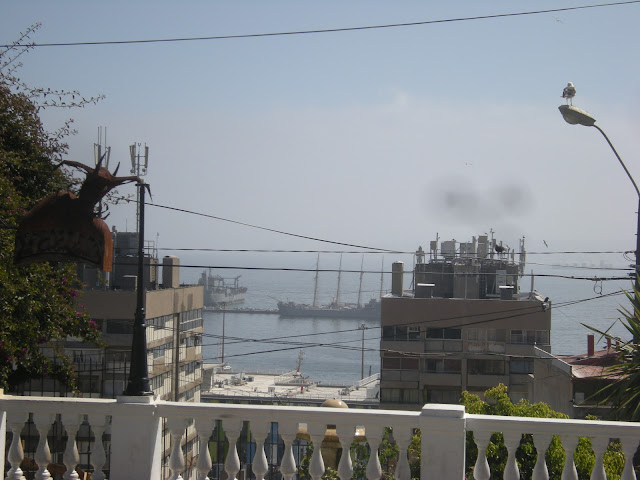Wednesday,
9 January 2013
Today we went on the optional trip to Valparaiso, Vina
del Mar and the tour of the Veramonte winery.
We left the hotel at about 8:30 am and drove for about an hour and a
half to Valparaiso. The tour guide was
talking about the flora and fauna of Chile.
As we drove we could see pine trees, cactus and palm trees, which are
native to Chile. There are also
Eucalyptus trees as well, but I don’t think that they are native to Chile. Fauna consists of snakes that are not
poisonous to people, foxes, birds, deer of varying sizes, puma, wild cats and
Guanaca, which is a relative of the llama.
There are also condors with wing spans of about 10 feet.
The valley through which we were passing is one of
the most productive. I saw corn in addition to vineyards. Apparently they have started growing olives,
which produces olive oil.
Santiago is in the central valley between two
mountain ranges; the Andes on the east and the coastal range on the west. The rivers in Santiago are from snow and
glacier melt from the Andes, which geologically are fairly young. Chile is very earthquake prone and there are
about 2,000 volcanoes along Chile’s 3,000 mile length. Chile is split into 15 regions which are
equivalent to our states. Santiago is in
the center. At its widest, Chile is about
140 miles wide.
Chile gained its independence from Spain under the
leadership of Fernando O’Higgins (Father was Irish). The fighting started in 1810 and was
completed between 1818 and 1820. Fernando
O’Higgins died in 1841. At his dying
request, an expedition was sent to the Straights of Magellen. This expedition arrived 24 hours before a
French expedition which enabled the southern tip to be part of Chile. The Attacama desert is in the north. There are parts of this desert in which no
rain has ever been recorded. Neither
Chile, Peru nor Bolivia was interested in this area until copper was
discovered. A war was found and Chile won taking control of the area. During the gold rush in California of 1849,
Chilean miners joined the hunt.
Chile has exports of about $80 Million versus
imports of about $65 million.
Valparaiso is the main seaport of Chile. The city is like an amphitheatre with the port
being the stage. Buildings have
frequently been destroyed in earthquakes.
Many houses are built of wood frame with adobe between the wood. On the street side, there is corregated metal
usually painted a bright color. On the
inside, they have wood. This type of
construction is quite earthquake resistant.
Valparaiso has all the amenities of any modern city. The first pier was constructed of the
overturned hull of a ship wrecked vessel.
The main square is called Plaza Sotormayor. There is a building that was destroyed in the
last earthquake, but the outer walls were left standing. They replaced the building with a glass
building built inside the remaining outer walls.
Vina del Mar is adjacent to Valparaiso. It is principally a resort and a much
wealthier city than Valparaiso. About 1,000,000 people live between the two
cities. I joined Mark and Margaret for
lunch at a sandwich shop which was on the road along the waterfront. We stopped near of museum where they have one
of the statues from Easter Island. After
snapping a picture, I headed to the store where they sold Lapis Lazul. They had some very pretty pieces, which were
not cheap. We then headed to the winery
which was on the way to Santiago. I
found the winery stop most interesting. We were shown the vineyards where they
had two different type of grapes growing.
They also showed us some old wine making equipment they had in a sort of
museum. We saw the fermentation tanks
and the oak barrels in which the wine is aged.
They make a sauvignon blanc which is not aged. I particularly liked that wine. When it looks like the grapes might freeze,
they have helicopters fly low over the fields to cause the cold air to rise and
the hot air to go down. We were offered
three type of wine to sample and I enjoyed them. I should have had two of each of make up for
Elaine’s absence, but I was barely able to walk after three glasses. The owner of the winery also owns a winery in
the Napa valley.
We then headed back to Santiago. After resting a while, I went out to dinner
with two ladies who are apparently widows and are traveling together.
Street Scenes in Valparaiso
Street Scenes in Valparaiso
Street Scenes in Valparaiso
Street Scenes in Valparaiso
Street Scenes in Valparaiso
Street Scenes in Valparaiso
Sea Front - 4 master is Chilean Naval Training Ship
Street Scenes in Valparaiso
Plaza Sotormayor
Monument to Chilean Naval Hero
ONly outside walls were left after earthquake, so they built the new building inside the old walls
One of the castles on the ocean front
Statue imported from Easter Island, which is a Chilean possession
Street Scenes in Valparaiso
Street Scenes in Valparaiso
Veramonte Winery
Note Palm tree
vineyard
Oak Barrels of wine aging
Fermentation tanks
Restaurant where I had dinner with two of the women on the trip
Tomorrow we fly south!






















No comments:
Post a Comment